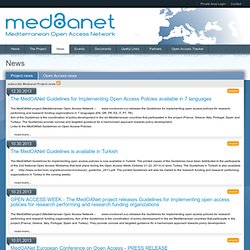

Cognitive science and more // cogsci.nl. Budapest Open Access Initiative. A logo celebrating the tenth anniversary of the Budapest Open Access Initiative in 2012, featuring the Széchenyi Chain Bridge in Budapest.
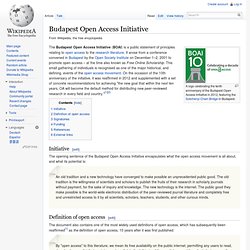
The Budapest Open Access Initiative (BOAI) is a public statement of principles relating to open access to the research literature. It arose from a conference convened in Budapest by the Open Society Institute on December 1–2, 2001 to promote open access – at the time also known as Free Online Scholarship. This small gathering of individuals is recognised as one of the major historical, and defining, events of the open access movement. On the occasion of the 10th anniversary of the initiative, it was reaffirmed in 2012 and supplemented with a set of concrete recommendations for achieving "the new goal that within the next ten years, OA will become the default method for distributing new peer-reviewed research in every field and country.
Initiative[edit] An old tradition and a new technology have converged to make possible an unprecedented public good. Open Access News. The UK Government Looks to Double Dip to Pay For its Open Access Policy. David Willetts introducing his pamphlet ‘Eight Great Technologies’ (Photo credit: Policy Exchange) The UK government continues to refine its policies toward public access to journal articles based on publicly funded research.

After a scathing rebuke from the Business, Skills and Innovation Committee, the Finch Group, responsible for the initial report that has driven much of UK policy, met last November to reaffirm their approach. Recently, David Willetts, the UK Minister for Universities and Science issued a letter to Dame Finch, thanking her committee for their work. This letter offers perhaps an unintended glimpse at the deep questions that remain about the economic feasibility of the UK policy, and what appears to be a request for some economic sleight of hand to help make ends meet.
The Research Councils United Kingdom (RCUK) open access (OA) policy, announced in July 2012, was a bold and trailblazing move. Scholarly publishing is a service industry. Like this: "Existe un nivel de vigilancia que supera al de la Unión Soviética" "Todos deberíamos exponer en nuestros balcones y ventanas un cartel grande indicando que la Ley de Seguridad Ciudadana insulta a España".
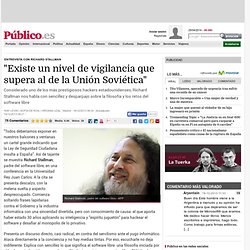
Así de tajante se muestra Richard Stallman, padre del software libre, en una conferencia en la Universidad Rey Juan Carlos. A la cita se presenta descalzo, con la melena suelta y aspecto despreocupado. Comienza soltando frases lapidarias contra el Gobierno y la industria informática con una sinceridad divertida, pero con conocimiento de causa: el que aporta haber estado 30 años aplicando su inteligencia y "espíritu juguetón" para hackear el software y desafiar al monopolio de lo privativo. Presenta un discurso directo, casi radical, en contra del servilismo ante el yugo informático. The Cost of Knowledge. Why Elsevier is completely in the right… and totally wrong. The internet was all aflutter last week because Elsevier has sent thousands of take-down notices to Academia.edu, a social networking site where many researchers post and share their published papers.
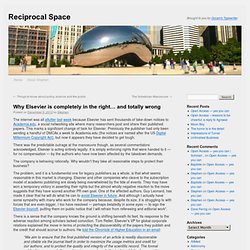
This marks a significant change of tack for Elsevier. Previously the publisher had only been sending a handful of DMCAs a week to Academia.edu (the notices are named after the US Digital Millennium Copyright Act), but now it appears they have decided to get tough. There was the predictable outrage at the manoeuvre though, as several commentators acknowledged, Elsevier is acting entirely legally. It is simply enforcing rights that were handed to it — for no compensation — by the authors who have now been affected by the takedown demands.
The company is behaving rationally. The problem, and it is a fundamental one for legacy publishers as a whole, is that what seems reasonable in this market is changing. Culture clash: Elsevier, academia.edu and copyright. Could academics have taken steps to avoid Elsevier’s takedown notices?
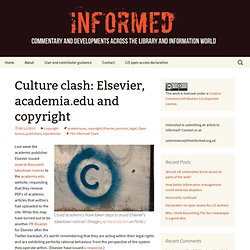
(Image c/o Horia Varlan on Flickr.) Last week the academic publisher Elsevier issued several thousand takedown notices to the academia.edu website, requesting that they remove PDFs of academic articles that authors had uploaded to the site. Open Wireless Movement: por un wifi global abierto. El proyecto Open Wireless Movement se ha propuesto como misión cambiar la mentalidad imperante hoy en día.
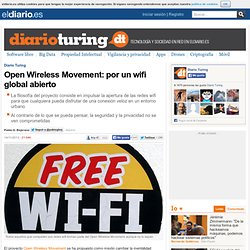
Es decir, del concepto de redes cerradas a un mundo en el que las redes abiertas sean la opción por defecto. Cada persona en su casa, cada empresa desde sus oficinas, puede aportar su granito de arena a crear un entorno en el que siempre haya una conexión wifi a la que agarrarse. La idea es que en cualquier entorno urbano, donde existen miles y hasta millones de redes wifi, llegue a haber un tejido de conexiones que permita a cualquier usuario que camine por la calle disfrutar de este ancho de banda compartido. Smartphones, tabletas y otros dispositivos que están por venir, como los smartwatch, podrían servirse de un entorno así. El Open Wireless Movement está trabajando con ingenieros voluntarios para construir tecnologías que permitan a los usuarios abrir sus redes sin correr riesgos de seguridad ni perder ancho de banda. Por qué una ciudad con las redes abiertas Imagen: mag3737.
TorBoox. The SV-POW! open-access decision tree. May 11, 2013 As part of the progressive erosion of RCUK’s initially excellent open-access policy, barrier-based publishers somehow got them to accept their “open-access decision tree“, which you can now find on page 7 of the toothless current version of the policy.
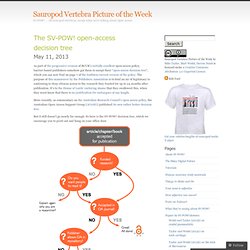
The purpose of this manoeuvre by the Publishers Association is to lend an air of legitimacy to continuing to deny citizens access to the research they funded for up to 24 months after publication. It’s to the House of Lords’ enduring shame that they swallowed this, when they must know that there is no justification for embargoes of any length. Mediterranean Open Access Network. The MedOANet European Conference will take place at the National Documentation Centre / National Hellenic Research Foundation in Athens, Greece, from 17 to 18 October 2013 during the International Open Access Conference.
